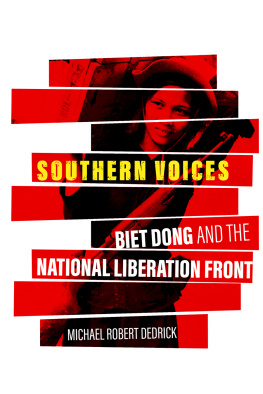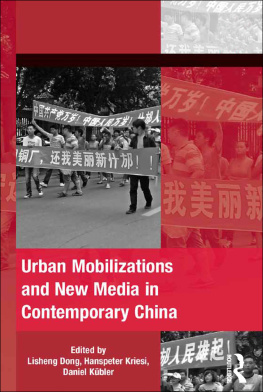SOUTHERN VOICES

Copyright 2022 by The University Press of Kentucky
Scholarly publisher for the Commonwealth, serving Bellarmine University, Berea College, Centre College of Kentucky, Eastern Kentucky University, The Filson Historical Society, Georgetown College, Kentucky Historical Society, Kentucky State University, Morehead State University, Murray State University, Northern Kentucky University, Spalding University, Transylvania University, University of Kentucky, University of Louisville, and Western Kentucky University.
All rights reserved.
Editorial and Sales Offices: The University Press of Kentucky
663 South Limestone Street, Lexington, Kentucky 405084008
www.kentuckypress.com
Unless otherwise noted, photographs are from the authors collection.
Library of Congress Cataloging-in-Publication Data
Names: Dedrick, Michael Robert, author.
Title: Southern voices : Biet Dong and the National Liberation Front / Michael Robert Dedrick; foreword by Christoph Giebel.
Description: Lexington : University Press of Kentucky, [2022] | Includes bibliographical references.
Identifiers: LCCN 2022002145 | ISBN 9780813155951 (hardcover) | ISBN 9780813156040 (pdf) | ISBN 9780813156149 (epub)
Subjects: LCSH: Mat tran dn tc gii phng min nam Viet NamOfficials and employeesInterviews. | Vietnam War, 19611975Personal narratives. | SoldiersVietnam (Republic)Personal narratives.
Classification: LCC DS559.5 .D436 2022 | DDC 959.704/3092dc23/eng/20220125
LC record available at https://lccn.loc.gov/2022002145
This book is printed on acid-free paper meeting the requirements of the American National Standard for Permanence in Paper for Printed Library Materials.

Manufactured in the United States of America.
 Member of the Association of University Presses
Member of the Association of University Presses
This work is dedicated to the hundreds of refugee villagers killed in American and ARVN air strikes on May 7, 1968, in Phu Tho Hoa, near Plantation Road, Cholon, Saigon, next to the barracks for Company A, 519th Military Intelligence Battalion.
In war, truth is the first casualty.
Aeschylus
It is clear now, although then obscured by American ideological perceptions, transitory GVN successes, and the communists own weaknesses, that the Viet Cong succeeded by exploiting the social and economic legacy of the colonial period. Only a collapse of communist will to win could have altered the outcome, and that will never faltered. The North Vietnamese tanks rolling into Saigon on 30 April 1975 sealed a victory that the Southern insurgents had won more than a decade before.
Thomas L. Ahern Jr., Vietnam Declassified
Contents
Foreword
Born of the authors desire to find answers to lingering questions from wartime service and its scope greatly enhanced by a chance encounter in front of the old Saigon Post Office, this book on the Biet Dong (Special Forces) of Vietnams Southern National Liberation Front (NLF) is nothing less than a revelation. The interviews with surviving former Biet Dong members that Mike Dedrick has conducted are chock-full of important insights and fascinating details that significantly contribute to our understanding of Southern Vietnamese revolutionaries. To this day, and with only a few notable exceptions, the fields of Vietnam Studies and Vietnam War Studies are largely lacking serious engagement with the Southern resistance. This is all the more surprising since Southern revolutionary nationalists provided the backbone to the nearly two-decades-long struggle waged by the communists and their allies. Indeed, without them, the victory of Vietnamese revolutionary nationalism in 1975 would have been impossible. Yet, after 1975, historical accounts have systematically marginalized the NLF and its Southern loyalists. They inconveniently stood in the way of simplistic US and anticommunist Vietnamese narratives of a binary conflictputatively between discrete political entities labeled North Vietnam and South Vietnamwhile also threatening to weaken the Northern-centric triumphalist claims of the Vietnamese Communist Party (VCP). Southern Voices will help correct this long-imbalanced historical record.
In the interviews, ably translated into English, the reader will learn intriguing details about the Biet Dongs organizational structure, their extreme secrecy and compartmentalization, and their operational duality of careful foundational planning and rapid, ad hoc deployment. The recollections contain glimpses of the sheer courage and mentality of sacrifice among Biet Dong members, their revolutionary-nationalist motivations, and their biographical and familial roots in long-established anti-colonial, anti-imperialist, and social revolutionary networks in Southern Vietnamese society, particularly outside urban, upper-class milieus. Additionally, the number of female Biet Dong is surprising and will contribute to historical analyses of the war that are more receptive to questions of gender. Along the way, the reader will also learn in very dramatic fashion about concrete historical events, not the least being the offensive of Tet Mau Than (lunar New Year 1968), and the mistreatment suffered by surviving Biet Dong in captivity. Beyond these aspects that a foreword can only selectively highlight, there is much more in this book that readers with serious interests in the Vietnam War or modern military history, particularly asymmetrical warfare, will find fascinating and illuminating.
Thanks to Mike Dedricks persistence in reaching out to former enemies and bringing their stories to the attention of an English-language public, this book on the Southern Vietnamese Biet Dong will invariably change the ways we will narrate and interpret the long history of violent conflict in Vietnam.
Professor Christoph Giebel
Henry M. Jackson School of International Studies and Department of History
University of WashingtonSeattle
SOUTHERN VOICES
Introduction
The Vietnamese called it the American War; the Americans called it the Vietnam War. At the center of that war was the Tet Offensive of 1968, called Tet Mau Than by the Vietnamese. The defining battle of Tet was the attack on the American embassy in Saigon, where sixteen Biet Dong (Rangers, special assault forces), including a man named Ba Den, blew a three-foot hole in the impregnable embassy wall, entered the compound, and engaged in a six-hour firefight that left thirteen attackers dead along with five US soldiers. For Americans, the cataclysmic shock of the country-wide Tet attacks, and particularly the embassy attack, were a turning point in their support of the war, especially after the often-repeated promise of the light at the end of the tunnel that predicted victory.
In 1968 I was an analyst/interrogator-linguist, part of Company A, 519th Military Intelligence Battalion, 525th Military Intelligence Group. I worked out of a joint US-Vietnamese prisoner of war compound called the Combined Military Interrogation Center (CMIC), located in Cholon, Saigon, down the street called Plantation Road from Company A, near the Phu To Hoa racetrack.
In February of 1968, while on night duty at CMIC, I was assigned to interrogate a wounded POW, Ba Den, who was one of the Biet Dong commanders and one of three survivors of the embassy attack. It was because of that interaction, and the significance of the Tet attacksespecially the Saigon attacks, and in particular the attack on the US embassythat I returned to Vietnam in 2013 after an absence of forty-five years. I wanted to see if Ba Den was still alive and to meet this now famous soldier. This trip also included Hue, the Perfume River, Da Nang and the Cham ruins and museum, Hanoi, and Ha Long Bay.














 Member of the Association of University Presses
Member of the Association of University Presses